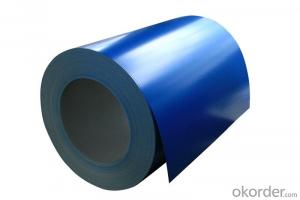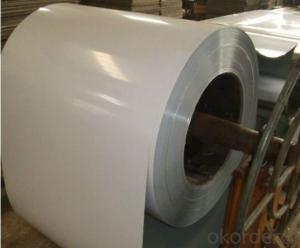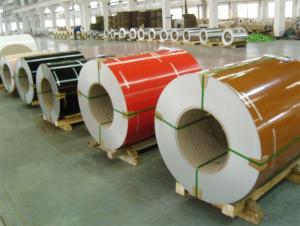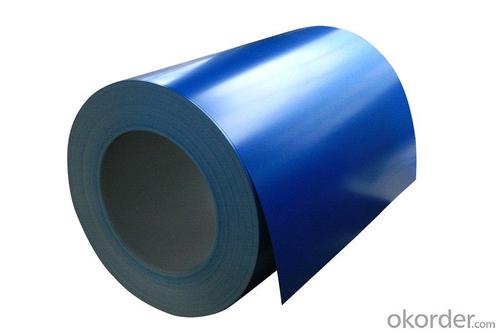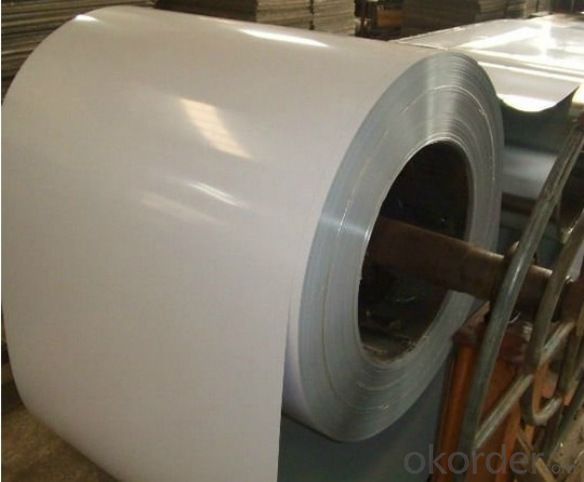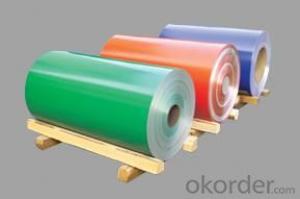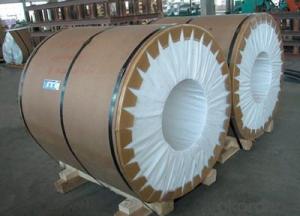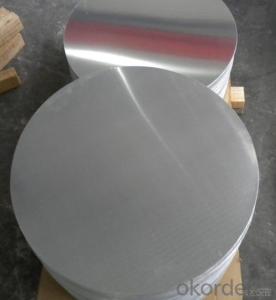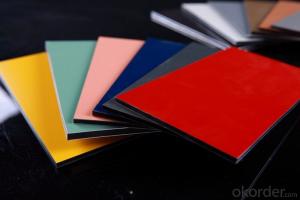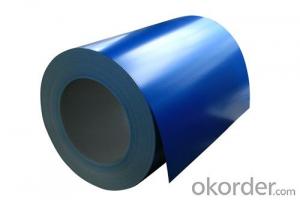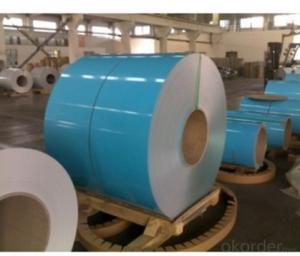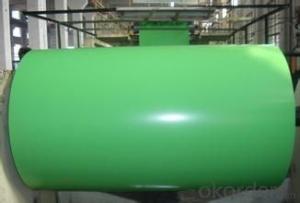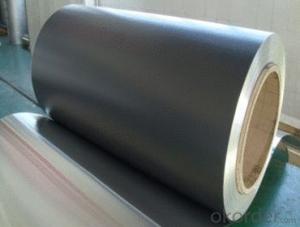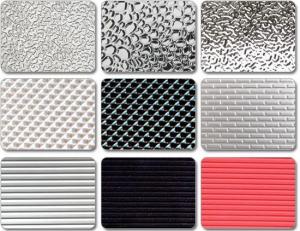Wholesale Aluminum Coils - PE-PVDF Coated, Good Price, High Quality
- Loading Port:
- Shanghai
- Payment Terms:
- TT or LC
- Min Order Qty:
- 8 m.t.
- Supply Capability:
- 2000 m.t./month
OKorder Service Pledge
OKorder Financial Service
You Might Also Like
Structure of Aluminium Coated Coil Description:
Coated aluminum coil/sheet are of a wide range of colors, which gives wonderful appearance no matter in residential and commercial constructions of great exhibition centers.
Interior: wall cladding, ceilings, bathrooms, kitchens and balconies, shutters, doors...
Exterior: wall cladding, facades, roofing, canopies, tunnels,column covers , renovations...
Advertisement: display platforms, signboards, fascia, shop fronts...
Main Features of the Aluminium Coated Coil:
Enviromental, light weight, waterproof, fireproof, anti-rust, weather resistance, easy cleaning, easy matching with other decoration materials...
Images of Aluminium Coated Coil:
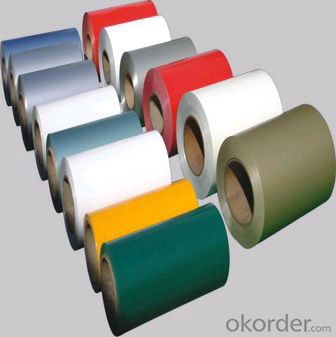
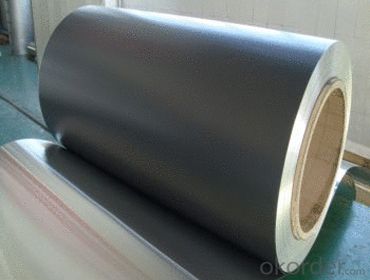
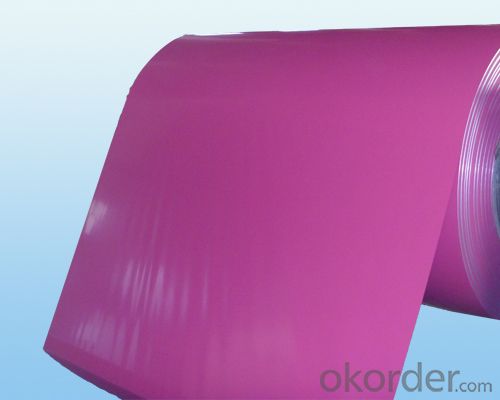
Aluminium Coated Specifications:
Grade | 1050,1060,1070, 1100, 1200, 2024,3003, 3004,3005, 3105, 5005,5052 5182,5754,8011 etc. |
Thickness | 0.1~1.6mm |
Width | 21~1600mm |
Application | Decorative Materials |
Surface Treatment | Coated |
Temper | O - H112 |
Hardness | More than 2H |
Yield (≥ MPa) | 160 |
Temper | O - H112 |
Ultimate Strength (≥ MPa) | 175 |
Elongation (≥ %) | 6 |
Packing material | Moisture-proof agent, steel tape bundle, wooden pallet, brown paper |
Method | Vertical( eye to sky) or horizontal( eye to wall) |
Standard spec | 1000mm xC, 1200mm xC etc |
Shipping | Container Loading or Bulk Pack |
FAQ of Aluminium Coated Coil:
a.What is monthly capacity
---CNBM is one stated own company and our monthly capacity is about 2000tons.
b. Now which countries do you export your goods?
---Now we export to South East Asia,Africa, North America,South America ect.
- Q: Can aluminum coils be welded?
- Absolutely! Welding aluminum coils is indeed possible. Aluminum is a material known for its exceptional weldability and is widely utilized in various industries because of its lightweight nature and resistance to corrosion. There are numerous welding techniques available for joining aluminum coils, including TIG welding (tungsten inert gas), MIG welding (metal inert gas), and even laser welding. Nevertheless, it is crucial to bear in mind that welding aluminum can be more demanding compared to other metals due to its high thermal conductivity and low melting point. As a result, it is imperative to employ appropriate welding methods and equipment, such as specialized aluminum welding wire and shielding gases, to guarantee successful and top-notch welds.
- Q: What is the typical warranty period for aluminum coils?
- The typical warranty period for aluminum coils can vary depending on the manufacturer and the specific product. However, in general, aluminum coils tend to have warranty periods ranging from 5 to 10 years. This means that during this time, the manufacturer will cover any defects or issues that may arise with the aluminum coils. It is important to note that some manufacturers may offer extended warranty options for an additional cost. Additionally, it is advisable to check the warranty terms and conditions provided by the manufacturer as they may have specific requirements or limitations for the warranty to be valid.
- Q: I am looking for a good comparison between carbon fiber and aluminum, we presently use aluminum in a lot of our manufacturing and may want to use cf. Does anyone have a simple breakdown of rough cost difference, weight savings, sheet thickness for a certain strength, that kind of thing, kind of struck-out looking on google unless I wanted a bike...Thanks in advance.
- CF tends to be more expensive than aluminum, but has some radar reflective (actually absorption) properties. CF has has good tensile strength but is not as flexible as aluminum...tends to crack under strain more than aluminum.
- Q: If you were to make something from each of these.which is more expensive? aluminum or carbon fiber ?which is stronger?What would the advantages or disadvantages of each be?
- CF is always more expensive - mostly because of production costs. Aluminum can be bent, machined, and extruded - all relatively cheap processes. CF has to be molded and typically requires a long cure time - so, slow and expensive. CF has higher strength to weight ratio - so if you're building an airplane or other thing where weight is critical... But, the strength thing is really complicated - how far does either deflect under a given load? And is deflection a good thing as in, say, a carbon fiber fly rod. At the deflection limit what happens? Aluminum takes a permanent bend, carbon fiber shatters. An aluminum car fender given a small bump will dent - a carbon fiber one will bounce back without a scratch. Given a larger bump the aluminum will dent more and the carbon fiber one will shatter. And while we're talking about bending - aluminum will 'cold work' - that is if you bend it back and forth and back and forth a zillion times first it becomes harder, then more brittle, then it breaks. Carbon fiber designs can be made to flex repetitively for much longer. Then there's heat issues. Aluminum can take a lot of heat. CF is actually 'composite construction' where some plastic (polyester resin, epoxy resin, etc) is required to bind the fibers together. All of these resins have different chractersitics when heated, but most of them have a Tg (temp at which they start to deform) of maybe 250 F or, for some hgih end epoxy resins, maybe 400 F - epoxy that can handle higher heat than that gets both expensive and difficult/dangerous to work with. So, carbon fiber leadin edges on the wing of an airplane that is designed to go supersonic might not be such a good idea. There's definitely no simple answer to this question.
- Q: Can aluminum coils be used for heat exchangers?
- Yes, aluminum coils can be used for heat exchangers. Aluminum has excellent heat transfer properties, is lightweight, and corrosion-resistant, making it a popular choice for heat exchangers in various applications, including HVAC systems, automotive, and refrigeration.
- Q: How do aluminum coils contribute to the aesthetics of a building?
- Aluminum coils can significantly contribute to the aesthetics of a building due to their versatility, durability, and aesthetic appeal. Firstly, aluminum coils can be easily shaped, cut, and formed into various architectural designs, allowing for greater flexibility in achieving the desired aesthetic of a building. Whether it is a sleek and modern look or a more traditional and ornate design, aluminum coils can be customized to meet the specific aesthetic requirements of a project. Additionally, aluminum coils come in a wide range of colors and finishes, enabling architects and designers to choose from a diverse palette to match the overall theme or style of a building. The option to select from different shades, textures, and patterns allows for endless possibilities in creating visually appealing facades and exteriors. Furthermore, aluminum is known for its durability and resistance to corrosion, making it an ideal material for architectural applications. The use of aluminum coils in a building ensures that the exterior surfaces will maintain their aesthetic appeal for an extended period, with minimal maintenance required. This durability makes aluminum coils a cost-effective choice for maintaining the aesthetics of a building in the long run. Moreover, aluminum coils can contribute to the energy efficiency of a building. They possess excellent thermal conductivity, allowing them to effectively dissipate heat and reduce the energy consumption required for temperature control. This energy-saving feature not only enhances the sustainability of a building but also adds to its overall aesthetic appeal by incorporating environmentally conscious design elements. In conclusion, aluminum coils contribute to the aesthetics of a building by providing flexibility in design, a wide range of color and finish options, durability, and energy efficiency. These qualities allow architects and designers to create visually appealing structures that align with the desired aesthetic vision while ensuring long-lasting beauty and sustainability.
- Q: Can aluminum coils be insulated?
- Yes, aluminum coils can be insulated. Insulation is commonly applied to aluminum coils in order to improve energy efficiency and prevent heat loss or gain. The insulation material is typically wrapped around the aluminum coil, forming a protective layer that helps to reduce thermal transfer. This insulation process helps to maintain the desired temperature inside the coil and prevents condensation, which can cause damage. Additionally, insulation can also improve the overall performance and lifespan of the aluminum coil system.
- Q: What are the different coil coating options for aluminum coils?
- There are several coil coating options available for aluminum coils, including polyester, polyurethane, fluoropolymer, and plastisol coatings. Each option offers unique benefits, such as durability, weather resistance, and aesthetics, allowing for customization based on specific requirements or desired appearance.
- Q: A bit of a question for the 1911 experts roaming around here. Per-say someone, who knew their way around a 1911 built one on an aluminum frame. To top it all off, if the finished gun were to be chambered in .38 super... how long would this combination last? I've heard horror stories about aluminum frames, and then I've heard some wonderful things... this question was to see if anyone had ever thought about/done this sort of thing before. Something tells me that Aluminum + .38 super wouldn't last too long... Most informative answer gets the ten point prize as usual.
- I have two concerns about using an aluminum frame for that caliber. First, and like everyone else who answered, I don't think it will stand up to the .38 Super +P for very long (and I wouldn't want to be around when it fails). Second, the reason I believe the frame will not last nearly as long as a steel or stainless (my personal suggestion) frame is that the grooves the slide fits and rides in will wear and enlarge MUCH faster than a steel or stainless frame will. This will, in my opinion, also quickly have an adverse affect on accuracy. Aluminum has it's place, but I don't think it's anywhere near this kind of firearm. On a side note, one of the other people who answered said that the aluminum will offer some corrosion resistance. This may generally be true, but salt water (like sweat) attacks aluminum significantly faster than it does steel, and stainless steel is almost non-reactive to it. If he wants a lighter gun for carry, Try an XD45. If I remember right they are rated for .45 +P, but call Springfield Armory to make sure. With the polymer frame they are much lighter than a 1911, and I have been very satisfied with the accuracy and the reliability of mine. Personally, I don't think the weight savings of the alloy frame is worth the extra care to keep from sweating on it or the much shorter lifespan the gun will likely have. If he isn't planning on carrying it, what is the point of lightening the gun? He'll feel a lot more recoil, especially if he does shoot the +P ammo.
- Q: What are the different protective film options for aluminum coils?
- Aluminum coils have a range of protective film options available, each with its own benefits and suitability for different applications. Some commonly used options include: 1. PVC Film: These films are highly resistant to moisture, chemicals, and abrasion, making them a popular choice for protecting aluminum coils. They offer excellent surface protection and come in various thicknesses and adhesive strengths. 2. PE Film: Another popular choice, PE films provide good resistance to moisture and UV radiation. They are generally more cost-effective than PVC films and are available in different grades, such as LDPE and LLDPE. 3. PP Film: Known for their tear resistance and high tensile strength, PP films are ideal for applications where coils may undergo rough handling or transportation. They offer good protection against mechanical damage. 4. PET Film: PET films offer exceptional clarity and transparency, making them perfect for applications that require visual inspection of the coils. They also provide good resistance to heat, chemicals, and abrasion. 5. Adhesive Coatings: In addition to films, adhesive coatings can be used to protect aluminum coils. These coatings are directly applied to the coil's surface and create a protective layer against moisture, corrosion, and scratching. When choosing a protective film for aluminum coils, it is crucial to consider factors such as the intended application, environmental conditions, handling processes, and desired level of protection. Seeking guidance from a supplier or manufacturer can help determine the most suitable option for specific requirements.
Send your message to us
Wholesale Aluminum Coils - PE-PVDF Coated, Good Price, High Quality
- Loading Port:
- Shanghai
- Payment Terms:
- TT or LC
- Min Order Qty:
- 8 m.t.
- Supply Capability:
- 2000 m.t./month
OKorder Service Pledge
OKorder Financial Service
Similar products
Hot products
Hot Searches
Related keywords
